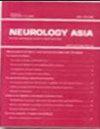基于互联网的远程医疗护理对心房颤动和中风患者生活质量的影响
IF 0.2
4区 医学
Q4 CLINICAL NEUROLOGY
引用次数: 0
摘要
研究背景本研究的目的是确定心房颤动和中风患者能否从通过互联网远程医疗护理在远程专科护士的监督下在家接受护理中获益。研究方法我们选取了2018年1月至2019年12月在我院接受治疗的房颤合并脑卒中患者共168例。将患者分为传统的居家自助护理组(对照组)和基于互联网的专科护士参与的基于出院后疗养护理模式的远程健康护理组(实验组)。对患者进行为期 12 个月的随访和观察,评估两种不同护理模式下患者的生存率、再入院率、日常生活活动能力、肢体运动能力、心理状态、心功能和心律控制、不良事件发生率以及患者及其家属的护理满意度。结果显示与传统的居家护理相比,专科护士提供的基于互联网的远程医疗护理显著提高了患者的存活率。此外,因心房颤动或脑卒中再次入院的患者明显减少,患者的日常活动能力和肢体运动能力明显提高,焦虑和抑郁情绪减轻,心功能指标和心律控制明显改善。此外,褥疮和轻微出血事件发生率降低,患者及其家属的护理满意度明显提高。结论由专科护士提供的基于互联网的远程健康护理使心房颤动和脑卒中患者在预后和生活质量方面受益匪浅。因此,这种护理方法值得广泛采用和推广。本文章由计算机程序翻译,如有差异,请以英文原文为准。
The effect of internet-based telehealth nursing on the quality of life in patients with atrial fibrillation and stroke
Background: The purpose of this study is to determine if patients with atrial fibrillation and stroke can benefit from receiving care at home under the supervision of remote specialist nurses through internet-based telehealth nursing. Methods: We selected a total of 168 patients with atrial fibrillation and stroke, who were treated in our hospital from January 2018 to December 2019. The patients were divided into a traditional at-home self-help nursing group (the control group) and an internet-based telehealth nursing group involving specialist nurses based on the post-discharge convalescence nursing modes (the experimental group). The patients were followed up and observed for 12 months, and the survival rate, readmission rate, daily life activities, limb motor ability, psychological state, cardiac function and rhythm control, adverse event rate, and the nursing satisfaction of the patients and their families were evaluated for the two different nursing modes. Results: Compared with traditional at- home nursing, internet-based telehealth nursing provided by specialist nurses resulted in a significant improvement in the survival rate of patients. Additionally, the readmission due to atrial fibrillation or stroke was significantly reduced, the daily activities and limb motor ability were significantly improved, the patients’ anxiety and depression were reduced, and the cardiac function index and rhythm control showed obvious improvement. In addition, the rates of bedsores and minor hemorrhage events were lower, and the nursing satisfaction levels of the patients and their families were significantly higher. Conclusion: Patients with atrial fibrillation and stroke benefit greatly from internet-based telehealth nursing provided by specialized nurses, both in terms of prognosis and quality of life. As a result, this approach to nursing care deserves wider adoption and dissemination.
求助全文
通过发布文献求助,成功后即可免费获取论文全文。
去求助
来源期刊

Neurology Asia
CLINICAL NEUROLOGY-
CiteScore
0.30
自引率
0.00%
发文量
76
审稿时长
>0 weeks
期刊介绍:
Neurology Asia (ISSN 1823-6138), previously known as Neurological Journal of South East Asia (ISSN 1394-780X), is the official journal of the ASEAN Neurological Association (ASNA), Asian & Oceanian Association of Neurology (AOAN), and the Asian & Oceanian Child Neurology Association. The primary purpose is to publish the results of study and research in neurology, with emphasis to neurological diseases occurring primarily in Asia, aspects of the diseases peculiar to Asia, and practices of neurology in Asia (Asian neurology).
 求助内容:
求助内容: 应助结果提醒方式:
应助结果提醒方式:


